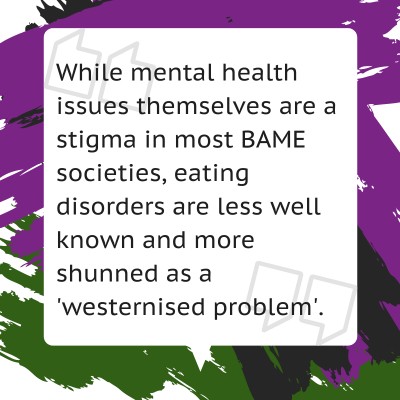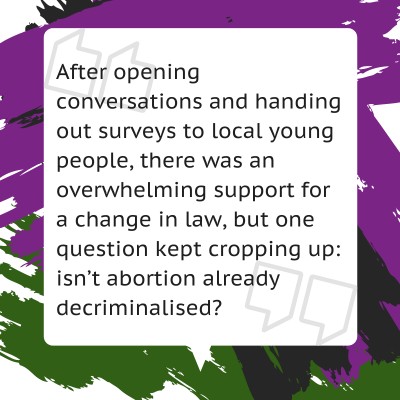Engender blog
Telemedical abortion services: joint letter to Maree Todd MSP, Minister for Public Health, Women's Health, and Sport
-400.png)
Today Engender and the British Pregnancy Advisory Service (BPAS) have, together with 25 women's organisations, human rights bodies, and healthcare providers, written to the Scottish Government asking them to make telemedical abortion services permanent in Scotland.
In March 2020, the Scottish Government provided temporary permission for telemedical early medical abortion care. This ensured that women and pregnant people all over Scotland could continue to access abortion care without travel to a clinic, decreasing their own and clinic staff’s risk of exposure to Covid-19. Our letter asks that this change be made permanent, continuing to provide women with as much choice as possible in accessing abortion care.
GUEST POST: Sex, Relationships and Parenthood – A Network Supporting Young Women and Girls with a Learning Disability
In this guest blog, Yvonne Kerr, Programme Manager in Sexual Health and Blood Born Viruses at NHS Lothian, discusses the national Relationships, Sexual Health and Parenthood and Learning Disability / Additional Support Needs Network.
Engender’s report, Our Bodies Our Rights, found that a lack of knowledge and access to information acts as a barrier to disabled women’s reproductive rights because of a huge knowledge gap regarding disabled women’s reproductive, sexual and maternal health. It also found that access to inclusive and targeted sex and relationships education for disabled young women and girls is also almost entirely absent from mainstream and specialist education.
![Graphic shows a light pink back ground with dark purple text that reads, "It became apparent early on in the life of the group that young people with additional support needs and/or learning disabilities were a group much more likely to miss out on this [RSHP] education, and that this was particularly the case for young people who had severe and complex additional support needs." The quote is attributed to Yvonne Kerr, Programme Manager in Sexual Health, NHS LOTHIAN. The Engender logo is bright pink circle with an equals sign at the centre of it, in the right hand corner of the graphic.](/siteimages/Blog/resized/yvonne-kerr-guest-blog-quotes-square-1080x1080-400.png)
We therefore recommended that “Scottish Government, Education Scotland and local authorities should work together to create a national network of RHSP workers specialising in disability who can share good practice across Scotland”. We are very pleased to be members and to work with Yvonne and others to help organise the secretariat for the Network to advocate for girls and young women’s rights in RSHP education. We asked Yvonne to write a blog about her work in this area.
--
GUEST POST: Food for thought
Dr Shridevi Gopi-Firth is a Speciality Doctor in Eating Disorders working in Scotland. Her international education and career, including third sector work across India, Russia and the UK have given Shri a wide exposure to diverse cultural, social, educational and healthcare settings, thus successfully complementing her lived experience and clinical skills to develop a holistic understanding of the person. Here, she explores how stigma around eating disorders can affect women in BAME communities.

Eating – the most basic need of all things living, from the prokaryotic amoeba to the Dalai Lama. So when this signal in the brain gets scrambled and the eating becomes disordered, the inevitable reaction of the general populace is confusion, indignation, frustration and pity – empathy is a far way off since one cannot truly understand what causes a person to turn away from this basic need. This is never more pronounced than in Asian and African cultures where food brings people together and is the centre of every festival and get-together, big and small. Food is serious business in these cultures – I mean, in Asia alone, there are several deities devoted to food, the growing of it, the eating of it, the digesting of it, the gifting of it – one does not mess around with the concept of food!
GUEST POST: Decriminalisation of Abortion for a Modern Scotland

Following the passing of a motion in support of decriminalisation of abortion during the Scottish Youth Parliament's virtual motion debates this spring, MYSP's Emily Harle and Erin Campbell have written for us on why access to abortion is an important issue for Scotland's young people.
Emily Harle (she/her) is a Trustee and member of the Scottish Youth Parliament (MSYP) for Glasgow Kelvin, and Erin Campbell (they/them) is an MSYP for Midlothian North and Musselburgh, and the Deputy Convenor of SYP’s Equalities and Human Rights Committee. The Scottish Youth Parliament is the democratically elected voice of Scotland’s young people, aged 12-25. You can read more about SYP here, and follow them on Twitter @OfficialSYP. You can also follow Emily @EmilyMSYP, and Erin @syperincampbell.
In 1861, the Offences Against the Persons Act passed and abortion became a criminal offence in the UK, with women facing a penalty of life imprisonment for terminating a pregnancy. This outdated law was never overturned. The 1967 Abortion Act, which is commonly said to have legalised abortion, did not fully decriminalise it. Instead, the law provided an extremely strict set of criteria under which the procedure would be permissible, including a requirement for two written doctor’s signatures to confirm that continuing the pregnancy would severely damage either the mother or child.
Data matters in our response to Covid-19
As Engender continues to work to ensure that women's equality is at the heart of Scotland's response to Covid-19, our Executive Director, Emma Ritch, writes about why gathering the right data is so important.
-400.png) One
of the ways in which we are trying to understand Covid-19, and respond
to the devastation it has brought to families and communities, is
through numbers. The number of tests administered to populations, the
numbers of people admitted to hospital, and the numbers of deaths
attributable to Covid-19 are reported on rolling news. Readers check the
charts produced by data journalists for signs that incidence of the
virus has peaked. Numbers are studded through reporting on possible
strategies for loosening lockdown while constraining transmission of the
virus.
One
of the ways in which we are trying to understand Covid-19, and respond
to the devastation it has brought to families and communities, is
through numbers. The number of tests administered to populations, the
numbers of people admitted to hospital, and the numbers of deaths
attributable to Covid-19 are reported on rolling news. Readers check the
charts produced by data journalists for signs that incidence of the
virus has peaked. Numbers are studded through reporting on possible
strategies for loosening lockdown while constraining transmission of the
virus.
Downloads
 Engender Briefing: Pension Credit Entitlement Changes
From 15 May 2019, new changes will be introduced which will require couples where one partner has reached state pension age and one has not (‘mixed age couples’) to claim universal credit (UC) instead of Pension Credit.
Engender Briefing: Pension Credit Entitlement Changes
From 15 May 2019, new changes will be introduced which will require couples where one partner has reached state pension age and one has not (‘mixed age couples’) to claim universal credit (UC) instead of Pension Credit.
 Engender Parliamentary Briefing: Condemnation of Misogyny, Racism, Harassment and Sexism
Engender welcomes this Scottish Parliament Debate on Condemnation of Misogyny, Racism, Harassment and Sexism and the opportunity to raise awareness of the ways in which women in Scotland’s inequality contributes to gender-based violence.
Engender Parliamentary Briefing: Condemnation of Misogyny, Racism, Harassment and Sexism
Engender welcomes this Scottish Parliament Debate on Condemnation of Misogyny, Racism, Harassment and Sexism and the opportunity to raise awareness of the ways in which women in Scotland’s inequality contributes to gender-based violence.
 Gender Matters in Social Security: Individual Payments of Universal Credit
A paper calling on the Scottish Government to automatically split payments of Universal Credit between couples, once this power is devolved to the Scottish Parliament.
Gender Matters in Social Security: Individual Payments of Universal Credit
A paper calling on the Scottish Government to automatically split payments of Universal Credit between couples, once this power is devolved to the Scottish Parliament.
 Gender Matters Manifesto: Twenty for 2016
This manifesto sets out measures that, with political will, can be taken over the next parliamentary term in pursuit of these goals.
Gender Matters Manifesto: Twenty for 2016
This manifesto sets out measures that, with political will, can be taken over the next parliamentary term in pursuit of these goals.
 Scottish NGO Briefing for UN Special Rapporteur on Violence Against Women
Joint briefing paper for the UN Rapporteur on Violence Against Women.
Scottish NGO Briefing for UN Special Rapporteur on Violence Against Women
Joint briefing paper for the UN Rapporteur on Violence Against Women.

Newsletter
Sign up to receive our newsletter here:
Sign up to our mailing list
Receive key feminist updates direct to your inbox: